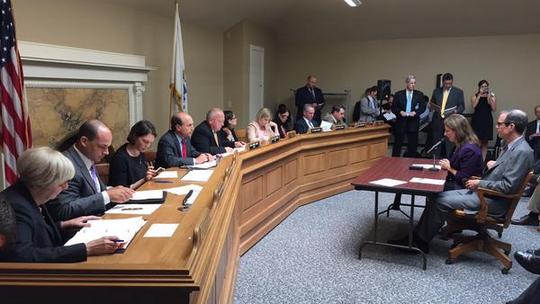
For more than a year, efforts to do away with noncompete agreements in Massachusetts have been steadily getting stronger. And for the local startup community in particular, that could be game-changing: Noncompetes, which prohibit employees from working for rival companies or starting their own competing ventures, are seen by many VCs and entrepreneurs as a dampener to innovation.
Community members voiced their concerns on the controversial subject this past Tuesday, June 23, during a legislative hearing held by The Joint Committee on Labor and Workforce at the Massachusetts State House—and on the whole, it appears that the Bay State is making baby steps toward a ban.
Continued obstacles
For background, then-Gov. Deval Patrick introduced an economic development bill last April proposing to completely eliminate noncompetes in the state of Massachusetts, freeing employees to move between rival companies or even launch competing ventures. While the Senate came to a compromise on limiting the duration of noncompete clauses that July, the agreement eventually fell out of last year’s economic bill. Then, in January of this year, a series of new bills were filed in Massachusetts to limit these agreements, including one from Senator William Brownsberger and Representative Lori Ehrlich. Unlike the compromise attempted last year, this legislation proposed a full ban on noncompetes with very limited exceptions.
Tuesday's testimony was nearly 20:2 in favor of a ban on noncompetes. Several entrepreneurs testified to leaving Mass. for Austin, Texas, just to escape their non-compete clauses.
Ari Glantz, New England Venture Capital Association’s Program Manager, called Tuesday’s hearing a “great success,” with a “strong showing from our community.”
In attendance were Flybridge Capital’s Jeff Bussgang, The Grommet’s Pam Crombie, Highland Capital’s Paul Maeder, On Shape’s Dan Shore, Spark Capital’s Bijan Sabet and Lighthouse Capital’s Gwill York.
The testimony was nearly 20:2 in favor of a ban on noncompetes, with even the primary spokesman—Mark Gallagher from Mass High Tech Council—opposing that reform was necessary. During his testimony, local software engineer Mike Newmann went so far as to tear up a $58,000 severance agreement in front of the committee because it contained a noncompete clause. To boot, several entrepreneurs testified to leaving Massachusetts for Austin, TX, just to escape their non-compete clauses.
This past April, Senator Brownsberger told BostInno that the main reason why we still have yet to see reform in Massachusetts is that some pillar tech companies are still maintaining a stronghold on noncompete policies. Among the firms in favor of keeping noncompetes are EMC Corp., Covidien, Boston Scientific and Abiomed. However, a number of tech companies have dropped their non-competes in recent years, including Acquia, RunKeeper and SavingStar.
Signs of potential change
ClearSky Data CEO and NEVCA board member Ellen Rubin was one executive who spoke out against noncompetes at the hearing. In her statement, she argued that these clauses slow innovation in Boston, harm workers' development and entrepreneurship and overall, maintain a status quo that hurts employees’ careers in the long run. She also noted that noncompetes mainly protect large employers, and aren't needed to protect IP, copyright and non-solicitation—which can be enforced otherwise. Earlier this year, ClearSky Data removed noncompetes from their employment contracts.
“Over the years, as I’ve recruited startup teams, I have seen firsthand how hard it is for workers—at large companies and startups alike—to leave for more innovative and challenging opportunities, due to a noncompete that might be enforced,” said Rubin. “This locks people into ‘lifer’ roles, instead of easing access to the breadth of local opportunities. The result is pockets of risk aversion, instead of bold risk taking and creativity, which are critical for the Massachusetts economy.”
If Massachusetts government and business leaders can do away with non-competes, Rubin says they’ll further support “a true innovation economy, like, or better than, Silicon Valley.”
NEVCA is still encouraging community members in favor of the ban to get involved, whether or not they were able to voice their opinions at the hearing. In line with that aspiration, the association just launched the Fair Employment Alliance to a positive response across all social platforms—which Glantz says seeks to be “the unifying voice in the fight.” The alliance urges Massachusetts to join 48 other U.S. states in adopting non-solicitation and trade-secret agreements, which protect companies' intellectual property without handcuffing workers. Thus far, the FEA's petition to ban noncompetes has garnered 587 signatures. Those interested in contacting their state representatives can use the site to find the rep in their district. Additionally, supporters are encouraged to make donations for the cause in any amount they choose. Companies that have already dropped noncompete clauses can show their support for the effort by downloading a digital seal to display on their websites.
“Overall, it felt like the mood at this hearing was shifting in the right direction,” Glantz told BostInno in an email. “The committee was asking clarifying questions rather than trying to understand the broad strokes of the issues.”
Photo courtesy of Ari Glantz at NEVCA.








